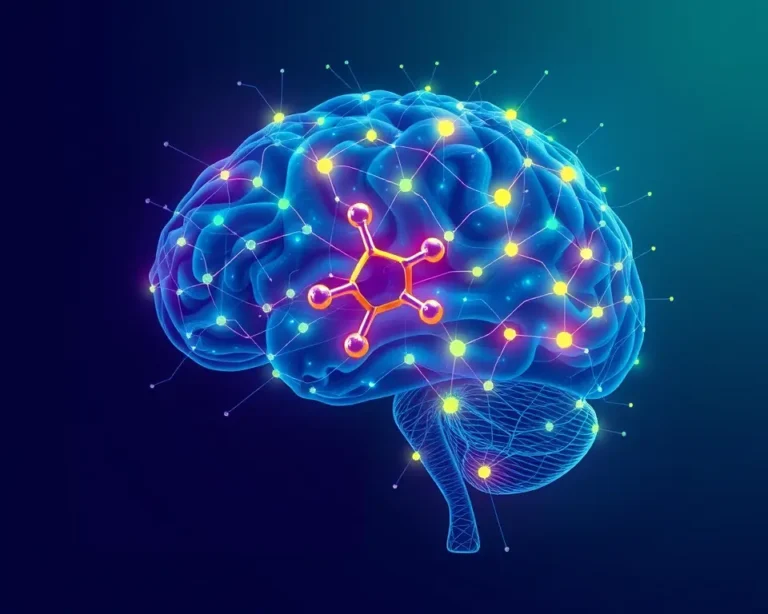Creatine, a well-known supplement in the fitness world for its muscle-building prowess, is increasingly being recognized for its potential benefits to mental health and cognitive function. While more research is needed, initial findings suggest that creatine supplementation may offer surprising advantages beyond the gym.
Creatine and the Brain: An Energy Boost
The brain, like muscles, requires a significant amount of energy to function optimally. This energy is primarily supplied by adenosine triphosphate (ATP). Creatine plays a crucial role in the ATP system, helping to regenerate ATP and maintain cellular energy levels. By increasing phosphocreatine stores in the brain, creatine supplementation can support various cognitive processes, particularly those requiring rapid energy production. This includes memory, attention, and problem-solving.
How Creatine Powers Mental Performance
- Enhanced Brain Energy Metabolism: Creatine is believed to enhance brain energy metabolism, which is often impaired in individuals with depression. By increasing the availability of phosphocreatine, creatine supplementation helps to restore energy balance in the brain.
- Neuroprotection: Creatine has demonstrated neuroprotective effects, potentially safeguarding neurons from various forms of stress. By maintaining cellular energy levels in the brain, creatine can help prevent neuronal damage and support brain health over time. This is of particular interest in research into aging and neurodegenerative diseases, where the brain’s energy metabolism is often compromised.
- Modulation of Neurotransmitter Systems: Creatine might influence neurotransmitter systems, including the serotonin and dopamine pathways, which play crucial roles in mood regulation.
Unexpected Mental Health Benefits of Creatine
Here are some surprising ways creatine might improve your mental health:
1. Easing Depression Symptoms
Research suggests that creatine may have antidepressant effects. Studies indicate that creatine supplementation can improve mood and cognitive symptoms of depression, especially in women. It’s believed that creatine enhances brain energy metabolism, which is often impaired in individuals with depression.
- A review by Kious et al. (2019) highlights that creatine has potential antidepressant effects and may improve brain energy production, storage, and utilization, which are often disrupted in depression.
- Creatine supplementation has been reported to improve depressive symptoms in 1–2 weeks of treatment in depressive patients, faster than the currently available antidepressants, which require 4–5 weeks to produce their therapeutic effects.
- A study published in Nature found an inverse relationship between dietary creatine intake and depression prevalence, suggesting that higher creatine intake may be associated with a lower risk of depression. This effect was particularly strong in females and younger adults not taking antidepressant medication.
2. Reducing Anxiety
Emerging data suggests that creatine may have anxiolytic (anti-anxiety) effects. This is based on the premise that improving the brain’s energy metabolism could positively affect the brain regions involved in anxiety.
- Anxiety disorders are often associated with oxidative stress and inflammation, and creatine can help to reduce damage caused by oxidative stress and potentially counteract the neurobiological processes associated with anxiety, promoting a calmer state of mind.
- Individuals who experience high levels of anxiety in social situations tend to have lower levels of creatine in a specific area of their brain, the left dorsolateral prefrontal cortex, which is thought to be linked to states of anxiousness and worry.
- By enhancing the production of energy within brain cells, creatine may help stabilize brain function and reduce symptoms of anxiety.
3. Boosting Cognitive Function, Especially After Sleep Deprivation
Creatine supplementation may improve cognitive function, particularly in tasks requiring rapid, high-intensity mental activity. It can also be beneficial for those experiencing acute or chronic stress.
- A recent study suggests that just one large dose of creatine supplements may improve cognitive performance in people who are acutely sleep-deprived. Processing capacity and short-term memory were enhanced.
- In older adults, creatine may boost brain function, protect against neurological diseases, and reduce age-related loss of muscle and strength. Supplementing with creatine for 2 weeks significantly improved memory and recall ability.
- A systematic review of randomized trials concluded that oral creatine supplementation may improve healthy individuals’ intelligence and reasoning abilities.
- Creatine supplementation may improve short-term memory.
Who Can Benefit Most?
While more research is needed to fully understand the effects of creatine on mental health, certain groups may benefit the most from supplementation:
- Vegetarians and Vegans: Since meat is the best dietary source of creatine, vegetarians and vegans often have lower creatine levels. Supplementation can help improve cognitive performance in these individuals.
- Older Adults: Creatine supplementation may improve memory and cognitive function in older adults.
- Individuals Under Stress: Creatine may be more beneficial for people experiencing acute/chronic stress.
- People with Depression: Creatine may improve brain energy production, storage, and utilization, which are often disrupted in depression.
- Those Recovering from Brain Injuries: Creatine supplementation improves aspects of recovery from traumatic brain injury in children.
Dosage and Safety
The studies reviewed typically used a daily dose of 4 to 5 grams of creatine monohydrate. Some studies used a loading dose of 20g per day for a short period. This dosage was well-tolerated by participants.
Creatine is generally considered safe for most people. However, it’s always best to consult with a healthcare professional before starting any new supplement, especially if you have any underlying health conditions.
The Future of Creatine and Mental Health
The research on creatine and mental health is still in its early stages, but the initial findings are promising. As we continue to learn more about the benefits of creatine for the brain, it may become a valuable tool for supporting mental well-being and cognitive function. Further research is needed to establish dosing guidelines, understand the mechanisms involved, and identify populations that could benefit the most from creatine supplementation.







